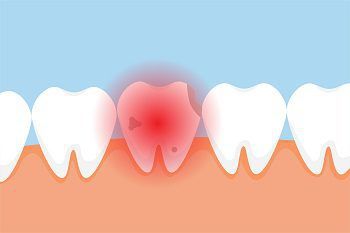Wisdom tooth infection: causes, symptoms, and treatment.
Wisdom teeth are your molars. These are the enormous teeth in the rear of your mouth, often known as the third molars. They are the last teeth to develop. Moreover, wisdom teeth usually grow between the ages of 17 and 25. You require a dentist's care if you have a wisdom tooth infection.
Why do we have wisdom teeth?
Teeth are classified based on their arrangement and function. Sharper teeth, near to front teeth, help to tear meal into tiny bits by your front, while your rear teeth, which are flatter, crush the food. The molars are these broader teeth. Furthermore, each adult molar has four teeth on the mouth's top, bottom, and sides. Adults have three sets of molars.
Humans grow their initial set of "baby" teeth from infancy through early adolescence, lose them, and then create a brand-new set of teeth that they will keep for the rest of their lives. However, just two sets of molars, totaling eight teeth, erupt simultaneously as those adult teeth. Most adults begin to grow their third set of molars, the furthest back, between the ages of 17 and 21. As they erupt last and when you're "older and wiser," these molars are generally referred to as wisdom teeth.
Anthropologists think humans have progressively evolved past the necessity for wisdom teeth due to the simplicity of modern diets. Therefore, some people may never obtain any. Like the appendix, wisdom teeth are prone to disappear and cease to exist entirely. They may eventually vanish altogether. However, the majority of adults today get their wisdom teeth.
Your wisdom teeth may not be prominent, but that doesn't mean they aren't there. Sometimes wisdom teeth never fully develop and never show. An X-ray can confirm if you have wisdom teeth buried behind your gums.
Problems with Wisdom Teeth
Impacted teeth are wisdom teeth that have not yet broken through the gums. Whether or not they are visible, wisdom teeth can harm oral health. This can occasionally lead to even more issues than visible wisdom teeth.
The following are the issues related to wisdom teeth:
Wisdom tooth infection
For several reasons, wisdom teeth are more prone to infection than most other teeth. Because of their location in the very back of the mouth, it can be challenging to floss appropriately adjacent to them, which encourages bacteria growth.
How infection occurs
Because they are more challenging to clean, wisdom teeth become infected. When brushing and flossing, it can be simple to overlook the area between your wisdom teeth and the rear of your mouth. Between the tooth and the gums, food and germs can become lodged.
It's possible that impacted wisdom teeth won't emerge properly from your gums. It could only partially show itself, grow at an angle, or grow entirely sideways.
When an excessive number of bacteria penetrates the outer, tough layer of enamel, it causes a cavity or tooth infection. This is because degradation is more prone to occur due to its form and angle. A wisdom tooth that is just partially impacted is more likely to become infected.
A variety of microorganisms can bring on a wisdom tooth infection. Rarely, the infection may spread to the skull and other parts of the mouth.
Symptoms of wisdom tooth infection
- Sensitivity
- Discomfort
- Swelling or sensitive gums
- Bleeding
- Red and swelling gums
- Bad breath and taste
- White fluid surrounding the teeth
- Jaw pain and stiffness in the jaw
- Trouble while speaking, breathing, or opening your mouth

Treatments
A wisdom tooth infection might be treated by:
- Medicine to treat the tooth
- Surgery to remove teeth
- Dental work to repair it
- Removal of wisdom tooth
Your dentist will check your teeth and do a local X-ray. This will assist in determining the best course of therapy for your tooth.
Medications
Antibiotics are required to treat an infection in a wisdom tooth. Antibiotics aid in the healing of an infected tooth and stop the spread of bacteria. Take this for at least a week before having the damaged tooth fixed or extracted. Additionally, before and after an infection of the wisdom teeth, your dentist might advise pain medication.
Dental work
You'll need to visit your dentist once again to have the tooth fixed or extracted after treating the infection. It's similar to repairing other teeth to fill a cavity in a wisdom tooth. You might require a crown or filling.
Additionally, your dentist could file down the tooth's top or sides. This removes any lumpy or jagged edges that can catch food and microorganisms. If there is crowding, it also helps to make the tooth slightly smaller.
Removal of wisdom tooth
Your dentist might wholly or partially remove your wisdom teeth if damaged. It is possible to extract additional impacted wisdom teeth. This reduces the risk of new diseases. An infection from impacted wisdom teeth may require dental surgery.
To aid in the growth of impacted wisdom teeth, your dentist may remove gum tissue from its top. Furthermore, coronectomy is a dental treatment that extracts the apex of the wisdom teeth—coronectomy aids in defending the jawbone surrounding the tooth and the dental roots and nerves.
Surgery
A wisdom teeth extraction might be challenging. Your dentist either gives you general anesthesia or local anesthetic delivered via injection. The process could take twenty minutes or more. Furthermore, your dentist removes the tooth in sections by your dentist. This lessens the risk of jawbone and nerve damage.
Following wisdom tooth removal surgery, potential risks and adverse effects include:
- Bleeding
- Infection
- Tongue, lower lip, or chin numbness
- Jawbone weakening
A mouth infection may develop two weeks or even two months after having wisdom teeth. To treat it, you might require an additional dose of antibiotics. Inform your dentist of any symptoms.
When to see a doctor?
Call your dentist and schedule an appointment if you have pain or discomfort in or around wisdom teeth. It could be challenging to see this location. To determine the source of the discomfort, you'll probably require a dental examination and an X-ray scan.
Don't disregard any signs relating to your teeth, gums, or jaw, such as:
- Sensitivity
- Discomfort
- Gum swelling or sensitive gums
- Bleeding or red gums
- Bad breath, an unpleasant taste in your mouth, and white fluid or leaking around the teeth
- trouble breathing, opening your mouth, or speaking due to jaw pain, swelling, or stiffness
- A wisdom tooth infection may also produce fever, chills, nausea, headache pain
Why do wisdom teeth need to be removed?
Even when there are no infections, dentists usually advise removing wisdom teeth. Your dentist recommends removing them because they start to emerge since they could crowd your mouth when they erupt, harming or shifting other teeth and causing pain in the future.
To prevent these teeth from erupting later and undoing all the hard work of sculpting your jaw and teeth, dentists will occasionally advise wisdom tooth removal before any orthodontic work, such as braces.
Teenagers should be assessed for wisdom tooth extraction surgery. This can assist in stopping any possible issues before they ever arise. Younger patients recover more quickly from surgery since the roots and bone have not yet fully developed.
Your dentist must keep a close eye on your wisdom teeth if you decide against having them removed. When selecting whether or not to remove these teeth, make sure to ask a lot of questions because surgery is always dangerous. Over time, wisdom teeth often cause additional issues.
Removal Recovery
Following surgery, your mouth is more susceptible to infection, so you must adhere to your dentist's recommendations for keeping your wounds clean. This probably entails gargling with salt water, quitting smoking, and avoiding meals with seeds or other small particles that could get lodged in your healing gums.
Though recovery from wisdom tooth removal typically takes a few days, some pain may linger for as long as a week. Inquire with your dentist about the safest painkillers to take.
Although recovering after wisdom tooth removal can be painful, for many people, it's an excellent method to avoid needing more dental surgeries.
Conclusion
Maintaining good oral hygiene, such as brushing and flossing many times daily, can help prevent the infection of your wisdom teeth.
Some individuals lack wisdom teeth. Therefore, if you are fortunate enough not to have third molars, you can skip having these teeth extracted. Even if your wisdom teeth aren't bothering you, keep regular dental appointments every six months.
Your dentist can closely monitor these developing teeth and advise removal when necessary.
*Neither this nor any other content in this media is meant to prescribe, recommend, or prevent any treatment or procedure. We highly recommend that you get the advice of a qualified dentist or other medical practitioners regarding your specific dental condition.
Contact your Danville Orthodontics, Dr. Hoss Abar, DDS, MSD, at Danville Orthodontics to learn more about Wisdom tooth infection.
Resource:
What Is The Procedure For Wisdom Tooth Extraction?
*Neither this nor any other content in this media is meant to prescribe, recommend, or prevent any treatment or procedure. We highly recommend that you get the advice of a qualified dentist or other medical practitioners regarding your specific dental condition.
